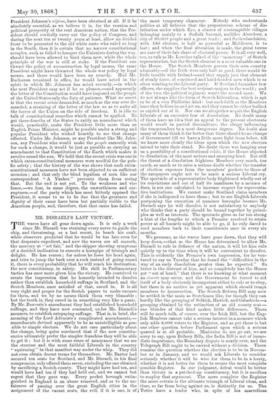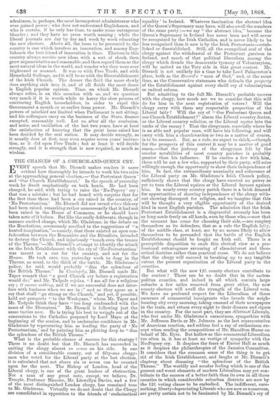MR. DISRAELI'S LAST VICTORY.
THE waves have all gone down again. It is only a week since Mr. Disraeli was straining every nerve to guide the ship, and threatening, as a last resort, to beach his craft, while observers predicted that he would be too late even for that desperate expedient, and now the waves are all smooth, the mercury at "set fair," and the skipper showing symptoms .of a decided inclination to execute a hornpipe of triumph and delight. He has reason ; for unless he loses his head again, and tries to jump the bark over a rock instead of going round it, there is every probability that he will reach his destination, the new constituency, in safety. His skill in Parliamentary tactics has once more given him the victory. He contrived to create the impression that he honestly intended to dissolve rather than establish household suffrage in Scotland, and the Scotch Members, once satisfied of that, caved in. It is all very right and proper for the Scotch papers to make excuses for them, and we by no means think them very blamable ; but the truth is, they caved in in something very like a panic. By Mr. Bouverie's amendment they had established household suffrage, and they have now consented, under Mr. Disraeli's menaces, to establish ratepaying suffrage. That is, in brief, the meaning of the Lord Advocate's complicated amendments,— amendments devised apparently to be as unintelligible as pos- sible to simple electors. We do not care particularly about the change, being quite convinced that if the new constitu- encies ultimately prefer the simpler franchise they will be able to get it ; but it is with some sense of annoyance that we see the stoutest and the most faithful Liberals in the country ."
squirming" in that manifest way under the whip. They did not even obtain decent terms for themselves. Mr. Baxter had secured ten seats for Scotland, and Mr. Disraeli, in his final compromise, only offered them seven, excluding the one obtained by sacrificing a Scotch county. They might have had ten, and would have had ten if they had held out, and we cannot but regret that they gave way. Every pocket borough extin- guished in England is an abuse removed, and as to the un- fairness of passing over the great English cities in the assignment of the vacant seats, the evil, if it is one, is of the most temporary character. Nobody who understands politics at all believes that the preposterous scheme of dis- tribution under which Eye, a cluster of contemptible villages belonging mainly to a Suffolk baronet, nullifies Aberdeen, a city of 90,000 people and a great trade ; and Satherlandshire, with 180 electors, is half as powerful as Middlesex, is to last ; and when the final alteration is made, the great towns are sure of their fair share of electoral power. It is all very well, too, to talk as Mr. Lowther talked of the ‘. monotony " of Scotch representation, but the Scotch element is a most valuable one in the House. The Scotch Members govern their own country admirably—if the Irish were only half as good, there would be little trouble with Ireland—and they supply just that element of steady force, of convinced and hard-headed men which is so often wanting to the Liberal party. If Scotland furnishes few officers, she supplies the best serjeant-majors in the world ; and of the two, the political regiment wants the second most. We do not always like the form of Scotch Liberalism, which is apt to be of a very Philistine kind ; but such faith as the Members have they believe in and act on, and they cannot be either bullied or cajoled out of it. Nor can we altogether acquit the English Liberals of an excessive fear of dissolution. No doubt many of them have an idea that an appeal to the present electorate would result in partial discomfiture, the clergy influencing the ten-pounders to a most dangerous degree. No doubt also many of them think it far better that there should be no change of Government till we have a little more light from below, till we know more clearly the ideas upon which the new electors intend to take their stand. No doubt there was hanging over us a possibility of a constitutional crisis, if the House objected to dissolution, of the most serious and annoying kind. But still the threat of a dissolution frightens Members very much, too much, so much as to raise a serious doubt whether the transfer of election expenses from the members' pockets to those of the ratepayers ought not to be made a serious Liberal cry. The spectacle of a representative body frightened wholly out of its convictions and out of half its manliness by a menace of fines, is not one calculated to increase respect for representa- tive institutions. We cannot make Scotland claim members if she is indisposed to have them ; but to see English Liberals postponing the execution of nominee boroughs because Mr. Disraeli says he will dissolve, is not satisfactory to anybody who thinks that a party should be bound together by princi- ples as well as interests. The spectacle gives us far too strong a hint of the lengths to which a Premier resolved to retain power at all hazards might be able to go, if he only dared to send members back to their constituents once in every six months.
We presume, as the waves have gone down, that they will keep down,—that as the House has determined to allow Mr. Disraeli to rule in defiance of the nation, it will let him rule quietly up to the time when it will be convenient to dissolve. This is evidently the Premier's own impression, for he ven- tured to say on Tuesday that he found the "difficulties in the way of an early dissolution greater than he expected." So bitter is the distrust of him, and so completely has the House got "out of hand," that there is no knowing at what moment an e'meute may occur, and the Government be forced to rid itself of a body obviously incompetent either to rule or to obey, but there is no motive as yet apparent which should tempt members to insurrection. The Scotch Reform Bill may now be settled in the main as Scotchmen like, for though they can hardly like the grouping of Selkirk, Hawick, and Galashiels—a grouping obtained by the extinction of an old county seat— one blunder of that kind makes little difference. There will be much talk, of course, over the Irish Bill, but the Eng- lish Members cannot take a serious interest in a measure which only adds 8,000 voters to the Register, and as yet there is but one other question before Parliament upon which a serious quarrel is at all probable. Ministries do not go out, we are sorry to say, upon Bribery Bills, the India Bill is not of imme- diate importance, the Boundary dispute is nearly over, and the Telegraph Bill ought to be carried without a division. There remains the question whether the election is to be in Novem- ber or in January, and we would ask Liberals to consider seriously whether it will be wise for them to be in a hurry, whether it is not better for them to secure the most complete possible Register. In our judgment, defeat would be better than victory in a patched-up constituency, but it is needless to employ that argument. The more complete the Register the more certain is the ultimate triumph of Liberal ideas, and time, so far from being against us, is distinctly for us. The Tories have a leader who, in spite of his marvellous adroitness, is, perhaps, the most incompetent administrator who ever gained power ; who does not understand Englishmen, and who is certain, if he only has time, to make some outrageous blunder ; and they have no press worth naming ; while the liberal journals are day by day and week by week educating the new electors. Above all, the issue to be presented to the country is one which involves an innovation, and among Eng- lishmen the best friend of innovation is time. Electors in this country always receive new ideas with a sort of shock, then grow argumentative and reasonable, and then regard them as the most natural ideas in the world, and wonder why they were ever frightened or amazed. It was so with Free Trade, and with Household Suffrage, and it will be so with the Disestablishment of the Irish Church. The denser the fluid the more slowly does anything sink into it, and of all fluids the most dense is English popular opinion. Time, on which Mr. Disraeli always relies, is on this occasion with us, and we question very much if it is worth while to hurry the slow process of convincing English householders, in order to expel this Government a month or so earlier from power. Mr. Disraeli's powers of mischief are limited when Parliament is not sitting, and his colleagues carry on the business of the State, finance excepted, reasonably well. Let us, after all the confusion, and noise, and vacillation of the last two years, have at least the satisfaction of knowing that the great issue raised has been decided by the real nation. It may decide wrongly, as it usually does at first, may even require seven years' instruc- tion, as it did upon Free Trade ; but at least it will decide strongly, and it is strength that is now required, as much as wisdom.































 Previous page
Previous page